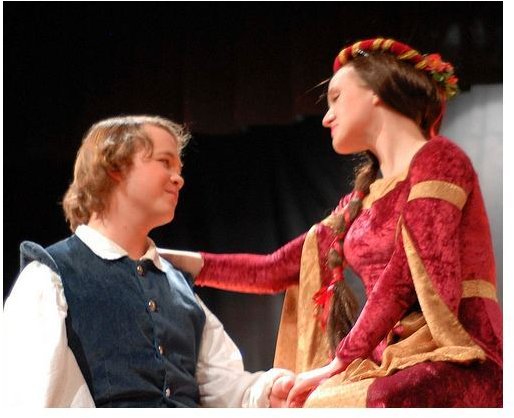Overview of Romeo & Juliet: Summary, Themes & Analysis
Brief Summary of Romeo and Juliet
If you prefer a scene by scene summary of the play, follow the link. For those who prefer a brief summary of the play, keep reading.
Romeo is a horny teenager in love with a girl named Rosaline who won’t put out. This depresses Romeo, so he wanders the forests at night and locks himself in his room during the day. He whines a lot to his friends, Mercutio and Benvolio, who suggest he find another hottie. As fate has it, an illiterate messenger asks Romeo and his crew to read a guest list. On that list is Rosaline, so the three decide to crash the party. There is, however, one slight problem: the party is hosted by the Capulets, the arch enemy of Romeo’s family, the Montagues. The three go anyway. About 8.3 seconds into the party, Romeo falls in love with Juliet, the only daughter of–you guessed it–the Capulet family.
After the party, Romeo stalks…errrrr…visits Juliet at her bedroom balcony (leading to some of the most famous quotes in English literature) and they decide to get married. Romeo runs to Friar Lawrence, perhaps the worst ecclesiastical leader since the Inquisition, and arranges the details. The same day as the wedding, Romeo’s cousin-in-law, Tybalt, kills Mercutio. Romeo kills Tybalt and is banished from Verona. That doesn’t, however, stop him from enjoying honeymoon bliss with his new bride before scuttling off.
As the two newlyweds enjoy each other, Juliet’s dad arranges a marriage between Juliet and Paris. Juliet, needless to say, finds this news troubling, so she heads to Friar Lawrence who comes up with the dumbest plan since the Children’s Crusade, giving Juliet a potion that will make everyone think she’s dead and arrange for Romeo to meet her at her tomb. As with most stupid plans, something goes wrong. Romeo doesn’t get the message, thinks Juliet’s dead and kills himself (after killing Paris). Juliet wakes up, sees her dead husband–at which time the Friar inexplicably leaves her–and kills herself.
Shakespearean Literary Devices
- Iambic Pentameter - Shakespeare’s plays are actually poetry. Iambic pentameter follows a basic pattern, consisting of 5 iambs. An iamb is a two-syllable foot containing an unstressed syllable followed by a stressed syllable. For more on rhythm and meter in poetry, follow the link.
- Soliloquy - A soliloquy is a long speech given by a character with nobody else on stage. Its purpose is to give the audience insight into a character’s thoughts. Juliet delivers a classic soliloquy before taking her sleeping potion in Act IV.
- Monologue - A monologue is a long speech given by a character to another character. Its purpose is similar to that of a soliloquy. Romeo’s whining to Friar Lawrence in Act III is a fine example.
- Irony - irony is a contradiction between appearance and reality. This treatment of irony in <em>Romeo and Juliet</em> is the best I’ve ever seen.
- Oxymoron - Act III, scene 2 contains wonderful examples of oxymoron, a two word, seemingly contradictory phrase. Shakespeare brilliantly shows Juliet’s tumultuous soul through the use of oxymoron.
- Theme: For an in depth look at themes in <em>Romeo and Juliet</em>, follow the link to the aforementioned more in depth Romeo and Juliet Study Guide.
- Figurative Language - Shakespeare’s deft use of simile, metaphor, meiosis, hyperbole, imagery, and pun make Romeo and Juliet a wordsmith’s delight.
- Tragedy - Just about everyone dies or has their life ruined. That’s tragedy. Classical tragedy follows a specific pattern. It involves someone of noble blood, who because of a tragic flaw, is ruined.
Conflict in Romeo and Juliet
Montague vs. Capulet (person vs. person) - This conflict appears immediately with a sword fight between servants of the Montague family and servants of the Capulet family. The fact that it’s servants fighting and not the families demonstrates just how deep this feud runs. For an in depth look at character analysis in <em>Romeo and Juliet</em>, check out the link.
Romeo vs. Verona (individual vs. society) - Romeo’s banishment from Verona is the culmination of Romeo’s conflict with his society. He’s a lover in a fighter culture. His friends and family expect him to fight. He wants to love. After marrying Juliet, he is filled with love. His town is full of hate. He loses.
Juliet vs. Her Family and Societal Expectations (individual vs. society) - Juliet’s a girl. Girl’s aren’t supposed to think for themselves in 14th century Verona. She’s supposed to marry who her father says she marries. Juliet chooses her husband (granted, not the best choice) and when everyone abandons her–the nurse betrays her, her father beats her, her mother turns her back on her–she makes courageous choices, up to but not including that whole suicide thing.
Romeo and Juliet vs. Fate (person vs. supernatural) - There are some stupid decisions made in this play. There is also an incredibly large amount of bad luck: (1) Of all the people the illiterate servant could have ask ed to read the invitation list for the Capulet party, he chooses Romeo and his buddies; (2) Friar John just happens to get detained on his way to deliver an important message to Romeo; (3) It just so happens that Romeo runs into Tybalt on his way home after his marriage; (4) If Romeo arrives five minutes later, Juliet is awake and the two run off together.
